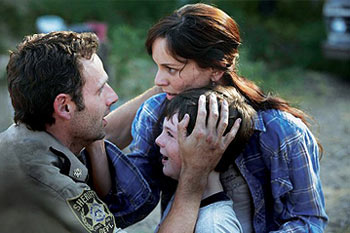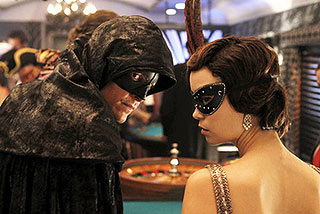Sometimes Undead Is Better: The Walking Dead
Published on January 30th, 2011 in: All You Need Is Now, Current Faves, Horror, Issues, TV |By Less Lee Moore
Although I’ve never read The Walking Dead comic series, I have been intrigued ever since Popshifter covered it in a past Halloween issue. When news of the AMC series popped up, I was relieved that it was receiving the episodic TV treatment; it seemed far too complex for a 90-minute movie. Interesting then, that the premiere episode was about that long, and far more engaging than much of the new breed of undead that has infected pop culture.

Rick, Lori, and Carl
As a diehard horror fan, my affections are frequently misunderstood or misinterpreted as some kind of prurient interest in the sick and depraved. Like all good additions to the horror canon, however, The Walking Dead isn’t just about zombies, the undead, or as the show itself refers to them, “Walkers.” Its social commentary is less heavy-handed than the recent spate of Romero zombie creations, but far more relevant. In fact, The Walking Dead has succeeded where four (or five) seasons of LOST failed: deftly mixing interpersonal drama with a touch of the supernatural, to raise provocative questions about our society.
(more…)
Sherlock Holmes Has A Cell Phone
Published on January 30th, 2011 in: All You Need Is Now, Current Faves, Issues, TV |By Lisa Anderson
In Central London, Scotland Yard is holding a press conference about a recent spate of suicides. The Detective Inspector insists that the deceased must all have something in common, and instantly, everyone present—police and press alike—receives a text stating simply: “Wrong!” Later that week, an army doctor, just back from Afghanistan, is checking out a potential flat with the strange, misanthropic young man he met only the day before. The landlady asks how many bedrooms they’ll be needing, saying that it’s okay if it’s only one. “Of course we’ll be needing two!” the doctor protests, shocked.
Both of these scenes take place in Sherlock, a miniseries created by the BBC but which also aired on PBS’s Masterpiece Mystery. They also both illustrate the way this contemporary retelling brings Sir Arthur Conan Doyle’s detective into the modern world, with its ever-changing technology and complicated social realities.
(more…)
The Cape: Learnin’ The Tropes
Published on January 30th, 2011 in: All You Need Is Now, Current Faves, Issues, TV |By Cait Brennan
Television has changed mightily since 2004, when a little show called Lost took to the airwaves and left behind a trail of time-traveling, Old Testament, daddy-issue, polar bear carnage. One after another, the networks have pelted home viewers with high-concept sci-fi and fantasy adventures, ranging from engaging (the unjustly canceled Invasion) to laughable (really? a reboot of V?) to just plain stultifying (The Event).

The Cape and Orwell
None of these genre efforts better typified pop culture’s creepy-uncle embrace of comic book culture than Heroes. Engaging and original in its first season, Heroes took a great cast of characters and ran them around in angel-dust spaghetti-squash circles for its last three years, finally collapsing under the weight of a mythos so impenetrable it made The X-Files look like Three’s Company. Strange and even brave, then, that NBC greenlit another big budget superhero show so soon after Heroes‘ implosion. It’s a good thing they did, because The Cape is a lot of fun—a show that both embraces and spoofs comic book tropes, with a rogue’s gallery of great characters that make it all worthwhile.
(more…)
Phineas and Ferb: Glory Days Are Here Again
Published on January 30th, 2011 in: All You Need Is Now, Cartoons, Comedy, Current Faves, Issues, TV |By Cait Brennan
Everything was better when we were kids. Ask anybody.
(more…)
Foetus, Hide
Published on January 30th, 2011 in: All You Need Is Now, Current Faves, Issues, Music, Music Reviews, Reviews |By Less Lee Moore
“Don’t ask me any questions you don’t want the answer to.”
—From “You’re Trying To Break Me”
At the risk of beginning a Foetus review with reference to another, I will do just that. If Sparks, the uncategorizable band composed (mostly) of brothers Ron and Russell Mael, can be said to make music that is practically theatrical, then Foetus, also known as JG Thirlwell, makes music that is downright cinematical.
And you know those annoying people who claim to despise movies that make them think? Those people will never appreciate JG Thirlwell. Sometimes it feels exhausting trying to figure out all his references and nods and motifs, especially when he keeps his true self so close to the chest. But for those of us who love listening to his music over and over—digging and pondering, delving deeper and deeper into it—the payoff is outstanding.
(more…)
Duran Duran, All You Need Is Now
Published on January 30th, 2011 in: All You Need Is Now, Current Faves, Issues, Music, Music Reviews, Reviews, The Internets |By Jemiah Jefferson
In 2011, what does “relevance” mean? A term heavily bandied about by the music press, especially in the UK, a band’s relevance is of paramount importance, ranking ahead of sexiness, competency, or pure enjoyment. Perhaps for these reasons, Duran Duran hasn’t been necessarily “relevant” since their second album Rio set a new bar for all musical artists everywhere.
(more…)
Girl Talk, All Day
Published on January 30th, 2011 in: All You Need Is Now, Culture Shock, Current Faves, Issues, Media, MP3s, Music, Music Reviews, Reviews, The Internets |By Janet Brusselbach
It feels really good to be listening to free music that’s not only intended to be free, but that’s also really good.
(more…)
The Lexingtons, Isn’t It Nice To Be Loved?/Choose Choice
Published on January 30th, 2011 in: All You Need Is Now, Current Faves, Issues, Music, Music Reviews, Reviews |By John Lane
Something audacious is happening in the otherwise-inconspicuous state of Rhode Island. The Lexingtons, helmed by their chief Eric Warncke, have taken the plunge that very few bands dare to anymore: the release of a double album, titled (with its yin-yang polarity in check) Isn’t It Nice To Be Loved?/Choose Choice.
(more…)
The Corin Tucker Band, 1,000 Years
Published on January 30th, 2011 in: All You Need Is Now, Current Faves, Feminism, Issues, Music, Music Reviews, Reviews |By Laura L.
If there’s one word to describe Corin Tucker, that’s punk rock. OK, that’s two words.
A few more words to describe Corin Tucker—post-riot grrrl. For those familiar with Tucker from her late, great band, Sleater-Kinney, one might expect a more guttural sound from her new band on its debut album, 1,000 Years. While there’s a definite punk edge on some of the tracks, this album often showcases the softer side of Corin Tucker. Those accustomed to Corin Tucker’s vocal trademarks will likely be surprised, and hopefully pleased, by the songs on this album.
(more…)
The Kid Is Slayed? The Crash Street Kids’ Supersonic Star Show
Published on January 30th, 2011 in: All You Need Is Now, Current Faves, Issues, Music |By Cait Brennan
Reductivism is the great tragedy of history. As the years pass and firsthand knowledge dies, the rough grain of history fades to white. Nuance is forgotten and arcane knowledge is lost. An infinite palette of color and shading fades, first to primary colors and eventually down to broad, ill-defined strokes—gouges in sandstone. Our life spans are too brief, our memories too quick to fade.
Thus in 2011, that perfect pop moment called Glam Rock is mostly reduced to flickering B-roll of Ziggy Stardust circa 1972, bless him. Or misremembered entirely as that thing Poison was doing in 1989, whatever that was. Some kid who fancies himself a music historian may mention T. Rex. But the amazing spectrum of bands and artists who made up the first glitter-rock era—from Sparks to Suzi Quatro, from Slade to the Sensational Alex Harvey Band, the Sweet, Mott The Hoople—what self-respecting 21st century boy, not even born when Marc Bolan died, could possibly hope to truly know that world?
Ryan McKay does. He’s the front man for Phoenix’s Crash Street Kids, and—along with band mates A. D. Adams, Ricky Serrano, and Ryan “Deuce” Gregory—the last, best hope for glam rock and roll.
(more…)